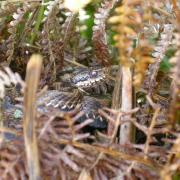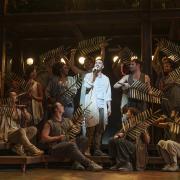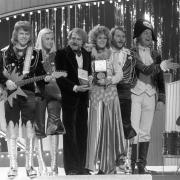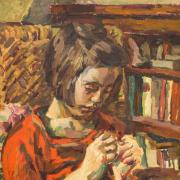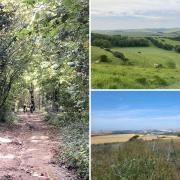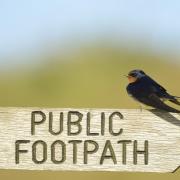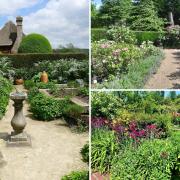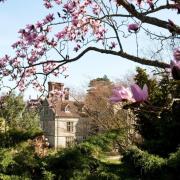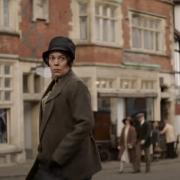Solution for the “A Man Apart” piece by Tony Ward in the Sussex Life July issue
Who is it? A Man Apart
Poems classical, poems lyrical,
myths, legends, heroes, Idylls of the King.
Elegy for a friend, elegy for a son.
In Memoriam.
.
Crafting, polishing, revising,
the people’s poet, the public poet,
So many worlds, so much to do.
.
Unwearied, unwearying ... a man apart.
The Chancellor’s medal,
The Laureate’s crown,
Ennobled.
.
Too popular, too pestered. Escape
from the gaze of prying eyes, escape
from Island home to highest hill.
.
Ring out the old, ring in the new,
Green Sussex fading into blue,
With one gray glimpse of sea.
.
No playwright he, no bard,
but Shakespeare in his hand,
his family around,
His hope to see his Pilot face to face,
When he has crost the bar.
Solution – Alfred, Lord Tennyson (1809 – 1892) – the best-loved poet of his age.
Explanation of embedded clues
Tennyson is often described as one of the greatest and most influential lyric poets of the later 19th Century. Lyric poems were originally those which could be accompanied by music on the lyre, but the term became applied to any poem of intense personal feeling. Tennyson’s first important book, published when he was aged 21, was in fact entitled Poems Chiefly Lyrical. He was also deeply interested in classical themes and, “myths, legends, heroes”. The Arthurian legend was a particular obsession of his.
Idylls of the King occupied him for almost half a century. His obsession in ‘getting it right’ was such that he even learnt sufficient Welsh to read some of the original documents relating to King Arthur, Camelot, and the Knights of the Round Table. This bore fruit in verses such as The Lady of Shalott, (No. 2 in The Nation’s Favourite Poems, 1996), ‘On either side the river lie/ long fields of barley and of rye...’, a superb example of his mastery of rhyme and rhythm, and the quite different non-rhyming Morte D’Arthur.
In 1867, at the age of 58 and at the height of his popularity, Tennyson decided to “escape from the gaze of prying eyes” at Farringford House, his home at Freshwater on the Isle of Wight. He had become “too pestered” by admirers. They climbed the trees surrounding the house, climbed over the wall into his garden and even peered through his windows in order to get a glimpse of him. The problem was particularly acute in the summer when the island was full of holidaymakers.
He built a second home, a decidedly grand one, for use during the summer months, “from Island home to highest hill”. The “highest hill” was exactly that. Black Down, near the Sussex/Surrey border, at 280 metres (919 feet), is the highest hill not only in Sussex but in the (now) South Downs National Park. Tennyson liked a stunning view. From Aldworth, his French-style semi-gothic house, Tennyson enjoyed magnificent views over the Low Weald. In his words he said of this landscape, ‘It is like one at Florence ... When I came back this summer and looked from the terrace at Blackdown, I thought it was exactly like Italy’. Aldworth was also secluded. The only ‘beaten track’ was a sunken lane that runs past the house from Haslemere, a few miles to the North. This now bears the name ‘Tennyson’s Lane’.
His relocation and his love of his view are the subjects of Verse 5. This verse combines two direct quotes from Tennyson.
‘Ring out the old, ring in the new’ is from In Memoriam A.H.H. This is a nearly 3,000 line masterpiece in commemoration of his close friend from his time at Trinity College, Cambridge, Arthur Henry Hallam. Hallam was engaged to Tennyson’s younger sister, Emily, but before they could be married he died, aged 22, from a brain haemorrhage. Tennyson was very deeply affected. He worked on In Memoriam for seventeen years. He was the complete perfectionist, well-known among his peers for “crafting, polishing, revising” to the extent that Robert Browning described his repeated editing of his material as ‘insane’. Tennyson though was “A Man apart, unwearied, unwearying”. In Memoriam was an immediate ‘top of the poetical pops’ with his followers. Prince Albert and Queen Victoria were among his many admirers. Queen Victoria later confided in Tennyson that she turned to this work for comfort after Prince Albert’s death.
The last two lines of verse 5 are from a short poem that he wrote for a friend after his visit. He often wrote ‘private poems’ for friends. These were not necessarily intended for publication.
You came and looked and loved the view
Long-known and loved by me:
Green Sussex fading into blue,
With one gray glimpse of sea.
Helen Allingham, the watercolour painter and illustrator, was a frequent visitor in Tennyson’s time and she captured in her warm and sympathetic style the house and the views from it. She lived not far away, in Witley, just over the Surrey border. She is famous for her paintings of the Surrey and Sussex countryside, and of farmhouses and cottages, often thatched. Tennyson’s grand house was somewhat of a departure from her normal subjects.
Verse 3 tells of the ways in which Tennyson’s talent was recognized and rewarded. At Cambridge, Tennyson was constantly writing instead of concentrating on his studies. In one way this paid off in that he won The Chancellor’s Gold Medal for Poetry, ‘no slight honour for a young man of twenty’. He never completed his degree. He and his two elder brothers had to leave Cambridge upon the death of their father. There were no student loans in those days.
“The Laureate’s crown” refers to his appointment to the post of Poet Laureate in 1850 on the death of his predecessor, William Wordsworth. In those days it was ‘a job for life’. Although the idea of the post was that the holder would produce ‘Public’ verse for events such as Royal birthdays and State occasions, Wordsworth had only accepted on the understanding that he would not be expected to do so. Tennyson however was just the opposite. He relished producing such work. He was not just “the people’s poet” but enthusiastically “the public poet”.
Perhaps his best known example of his ‘public’ poetry, certainly the most jingoistic, is The Charge of the Light Brigade, ‘Half a league, half a league,/ Half a league onward, ...’. He said that he wrote this in a matter of minutes after reading a report of the event in The Times newspaper over breakfast. This was not entirely true though, in his usual way, “polishing, revising”, he then spent a further two days revising it before he deemed it fit for publication.
“Ennobled” refers to his baronetcy. In 1884 Queen Victoria created him Baron Tennyson, of Aldworth in the County of Sussex and of Freshwater in the Isle of Wight. This was not though for the first time of asking. He had previously declined the honour in both 1865 and 1868 (when put forward by Disraeli), only eventually succumbing to Gladstone’s entreaties in 1883.
In his later years, the decade from 1874, from the age of 65, Tennyson tried his hand at writing plays. Being the leading poet of the Victorian age he had, perhaps inevitably, been compared to Shakespeare. It was the age of Empire when Great Britain saw itself as leading the world in virtually every field of endeavour, so why not a Victorian successor to the Bard? Tennyson wrote several plays. They all failed. One of the problems was that Tennyson found their subjects too interesting. He wrote at too great a length. His first historical drama Queen Mary in its original form was so long that it couldn’t play in one evening. Then came Becket, again he got carried away. It was considerably longer than Shakespeare’s Hamlet. After a decade of wasted effort Tennyson was forced to accept that his acknowledged genius did not extend to playwriting. He went back to doing what he did best, writing poetry. His gift was to craft poetry that remains in your mind, even when half-forgotten!
After Shakespeare, Tennyson is the most quoted writer in the Oxford Dictionary of Quotations. Some of those half-remembered lines:
‘Sunset and evening star,/And one clear call for me ....’
‘Come into the garden, Maud,/ For the black bat, night, has flown, ...’
‘Nature, red in tooth and claw ...’
‘Tis better to have loved and lost/ Than never to have loved at all. ...’
‘To strive, to seek, to find, and not to yield.’
The last line quoted above, the last line of Ulysses, was engraved along a wall at the entrance to the London 2012 Olympics athletes’ village. Clare Balding, the sports commentator, was among those who considered it to be particularly appropriate to use a poem about a figure from Greek classical mythology.
On another occasion, the novelist Kingsley Amis said, ‘Tennyson spoke for everybody ... at some time or other, when the whole world seems to have gone wrong.’
The opening verse of my poem contains the phrase “elegy for a son” as well as the previously explained “Elegy for a friend”. Both poems are written in the same metre. Lionel, his younger son had fallen ill in India and died during his passage back to England. His body was committed to the deep in the Red Sea. It was two years before Tennyson felt able to compose his elegy. As he also outlived his brother Charles and several old friends, there were more elegies. His subsequent poetry reflected both his sense of loss and his search for proof of life after death.
On 6 October 1892, not long after midnight, he died at Aldworth, overlooking the Sussex Weald, “Shakespeare in his hand,/his family around”. My last two lines are taken, with a change from first to third person, from Tennyson’s moving act of faith, his poem, ‘Crossing the Bar’.
It was always his wish that this poem be placed at the end of editions of his poetry.
Acknowledgement of sources
• Andrew Taylor, The Pocket Guide to Poets and Poetry, Remember When, 2011.
• Ana Sampson, I wandered lonely as a cloud ..., Michael O’Mara, 2013.
• Roger Mc Gough (Foreword), Poetry Please, Faber and Faber, 2013. (This collection of the nation’s best-loved poems contains eight of Tennyson’s, evidence of his continuing popularity).
• Christopher Ricks (Ed.), Selected Poems: Tennyson, Penguin Classics.
• en.wikipedia.org/wiki/Alfred,_Lord_Tennyson
• www.poetryfoundation.org/bio/alfred-tennyson
• Relevant websites found by searches for ‘Alfred, Lord Tennyson’, ‘Alfred, Lord Tennyson in Sussex’, ‘Aldworth, West Sussex’, ‘Qoutes about Alfred, Lord Tennyson’.



